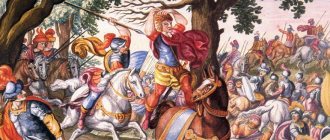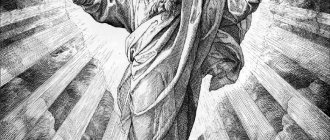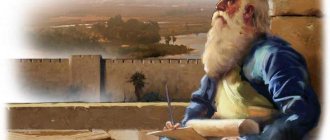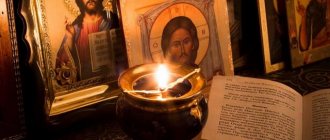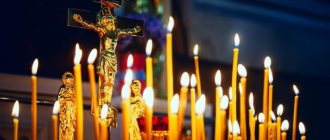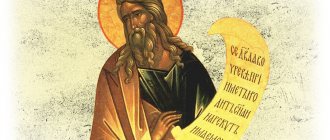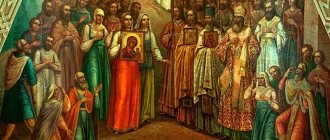The book of the prophet Daniel is part of the Old Testament prophetic books of the Bible. The authorship of the book is traditionally attributed to the prophet Daniel, who was taken into Babylonian captivity as a child. Daniel was brought up at court and soon received a court rank because he managed to interpret the dream of the ruler of the Babylonian Empire, Nebuchadnezzar.
There is an opinion that the prophet Daniel personally met with Alexander the Great, who, in the person of the prophet Daniel, worshiped the God of the Jews. However, this has not been proven by anything, since most scientists are inclined to believe that the prophet lived much earlier than the conquests of Macedon.
The Book of the Prophet Daniel is the first of the great apocalyptic books of the Bible.
Authorship issues.
According to traditional views, the prophet Daniel is the author of the book, but this opinion is often disputed due to the fact that many biblical scholars attribute the writing of the book to a time later than the lifetime of the prophet Daniel. The prophet lived in the 7th – 6th centuries BC. Many attribute the writing of the book to the 2nd century BC. e. and connect its writing with the events of the Maccabean revolt. Philologists characterize the language of the book as “late post-exilic.” Of all the books of the Old Testament, it is closest to the language of Chronicles. The language of the book is more characterized by later grammatical forms, which most likely indicates that the book was written after the 5th-4th centuries BC. e. This fact also does not support the authorship of the prophet Daniel.
Many scholars also develop the idea that it was impossible for the prophet Daniel to write a book, relying on Daniel’s numerous self-testimonies about his own wisdom. They believe that the prophet could not write so enthusiastically about himself. However, other biblical scholars say that Daniel in no way extols his own virtues. He considers his wisdom to be God's providence, and not personal merit.
Many scholars consider the Book of Daniel to be a compilation of works by many authors (at least eight) that were put together by an unknown editor.
However, in the language of the book one can find a lot of evidence in favor of the authorship of the prophet Daniel. So the book is written in 2 languages - Hebrew and Aramaic. It was these two adverbs that were “in use” among the Jews during the captivity period. Scholars have found some similarities in the Hebrew language of the books of Daniel and the books of Ezekiel, as well as similarities between the Aramaic of Daniel and the books of Ezra.
The presence of Babylonianisms and Persianisms in the text of the book also testifies to the authorship of Daniel. The presence of Greek words, to which supporters of the theory of writing the book during the conquests of Macedon appeal, also do not in the least deny the possibility of writing it in the time of Daniel, since relations between the Babylonians and Greeks began long before the time of Alexander, back in the days of Assyria.
Miracle in the Furnace of Fire
Arrogance clouded Nebuchadnezzar's mind. He decided to erect a huge statue of himself (as the Ruler of the Earth) on the field of Deire. Having created a golden idol, the king ordered all his subjects to bow to it as soon as they heard the sounds of musical instruments, under pain of death by burning. But three friends refused to bow to the golden idol (Marduk), for which, by order of King Nebuchadnezzar, they were thrown into a fiery furnace. But the angel of God kept them unharmed in the fire. Christian tradition believes that the angel who preserved the youths was the Archangel Michael.
The three youths in the fiery furnace are Jewish youths in Babylonian captivity, friends of the prophet Daniel, who were thrown into the fire by King Nebuchadnezzar for refusing to bow to the idol, but were saved by the archangel Michael and came out unharmed.
Nebuchadnezzar, amazed at what was happening in the flames, exclaimed: “Didn’t we throw three men into the fire bound? Behold, I see four unbound men walking in the midst of the fire, and there is no harm to them; and the appearance of the fourth is like the son of God.” After which he ordered the execution to be stopped. When the three youths came out of the oven, the Babylonians were convinced that not only did the fire not burn a hair on their heads, but even their clothes did not smell of fire. After which, amazed at the power of God, who knows how to save those who believe in him, he again exalted these three Jews.
The book of the prophet Daniel interpretation.
Prophet Daniel was a prophet during the Babylonian captivity. His texts are of Babylonian origin.
In accordance with this, his book bears traces of Babylonian origin: it, as a genuine work of a contemporary of the captivity, bears the imprint of this era. With the exception of some points, the book describes real historical events - the captivity, the life and upbringing of Jewish youths in Babylon, the class division in Babylon. The Prophet also managed to fully describe the life and customs of the Chaldean civilization.
The prophet Daniel is mentioned in the book of Ezekiel as a man distinguished for his wisdom.
The general idea of the book of Daniel is that the Son of Man will come and the Kingdom of God will come, and there will be no more Gentiles. The Kingdom of God must, according to the prophet, come after the fall of the four Kingdoms. Pagan rulers are just puppets in the hands of God who do His will. Even if they turn to the Jewish God, they will not be able to become rulers of the world. Power over the world will sooner or later be in the hands of the people of Israel. After the fall of the last of the four kingdoms, an eternal kingdom will reign, the head of which will be the Messiah, the Son of Man.
The purpose of writing the book is also considered to be the prophet’s personal attempt to show a model of piety and a way of righteous life in the conditions of Babylonian captivity. The author repeatedly emphasizes the idea that pagan peoples are not in a relationship with God, but are simply an instrument for expressing God's will - necessary, but temporary.
The book of the Prophet Daniel is of great historical significance. This is a kind of “bridge” between the Old and New Testaments.
Composition of the book of Daniel.
The book of the prophet Daniel is divided into two parts:
- Chapters 1 – 6 – historical part;
- Chapters 7 – 12 are the prophetic part.
The first part describes the personality and life of the prophet Daniel and describes contemporary events.
In the second part, the prophet sets out his visions about the fate of God's chosen people and pagan kingdoms.
Visions of David:
Chapter 7. About the four animals, symbolically meaning the four kingdoms.
Chapter 8. About the ram and the goat - symbols of the Medo-Persian and Greek kingdoms.
Chapter 9. About the seventy weeks.
Chapters 10 - 12. About the future of God's chosen people and pagan kingdoms.
Literary features.
Being an apocalyptic scripture, the book of the Prophet Daniel is distinguished:
- Allegorical,
- Symbolism
- An appeal to the fate of the people in the perspective of the implementation of God's plan.
- The mystery of style as a way to reflect the mystery of the future.
- Prosaic language.
- Bilingualism.
Historical setting.
Nineveh, the capital of Assyria, fell to the combined forces of Babylon and Media in 612 BC. Part of the Assyrians, led by Assurubalite, fled west to Harran, and from there proclaimed their dominion over all of Assyria. But in 611, Nabopolassar, the king of Babylon, moved his troops against the Assyrians settled in Harran. And the next year (610), in alliance with the Medes, attacked Harran. The Assyrians fled further west, beyond the Euphrates River. Harran surrendered to the Chaldeans. In 609 BC, the Assyrians turned to Egypt for help, and Pharaoh Necho I agreed with them.
In those days, King Josiah of Judah, in the hope of winning the gratitude of the Chaldeans, made an attempt to prevent the Egyptians from uniting with the Assyrian army, for which he went out to meet the Egyptian army at Megiddo. However, he was not only defeated, but he himself was mortally wounded in a battle with the Egyptians (2 Kings 23:28-30; 2 Chronicles 35:24). Having united their forces, the pharaoh and the Assyrians fought with the Chaldeans at Harran, but were defeated by them.
Apparently, at this time Assyria was leaving the historical scene; as for Egypt and Babylon, the conflict between them continued. Both armies met at Carchemish in 605 BC; The Babylonian army was led by Nebuchadnezzar. The Egyptians were defeated, and in May-June of that year Carchemish was destroyed by the Babylonians.
Pursuing the retreating Egyptians, Nebuchadnezzar moved south, capturing more and more lands, right up to the Syrian border, and approaching Palestine. But having received news of the death of his father Nabopolassar during this military campaign, he returned to Babylon to assume the royal crown; this was in August 605 BC.
Then, however, Nebuchadnezzar returned to Palestine and in September 605 approached the walls of Jerusalem. It was then that Daniel and other “youths” from aristocratic families were taken to Babylon as captives. Perhaps Nebuchadnezzar took them as hostages to keep the people of Judah from revolting. Or perhaps the king had other plans for the noble Jewish youths: for example, to educate them as “his people”, who, if Judea transferred to a vassal position, would occupy high administrative positions there. Returning to Babylon, Nebuchadnezzar reigned there for 43 years (605-562 BC).
Nebuchadnezzar came to Judah for the second time in 597, having learned about the rebellious behavior of King Jeconiah. Jerusalem was taken by the Chaldeans, who this time took 10 thousand captives to Babylon; among them was the prophet Ezekiel (Ezekiel 1:1-3; 2 Kings 24:8-20; 2 Chronicles 36:6-10). And for the third time Nebuchadnezzar returned to Judea in 588 BC. After a long siege of Jerusalem, the city fell and was destroyed, and the temple was burned; this was in 586. Most of the Jews, those who were not killed, were taken to Babylon (2 Kings 25:1-7; Jeremiah 34:1-7; 52:2-11).
The return of the Jews to their land became possible only in 539, when the Persian king Cyrus defeated Babylon and founded a new empire - the Medo-Persian. Since it was Cyrus's policy to return the conquered and "displaced" peoples of the Chaldeans to their lands, he issued a decree in 538 giving the Jews the right to return to Jerusalem if they wished (2 Chron. 36:22-23; Ezra 1:1-4) . About 50 thousand Jews, taking advantage of this right, came to their country and began to restore the temple. Daniel prayed for this (Dan. 9:4-19). The temple was completed in 515 BC (Ezra 6:15).
Almost 70 years passed from the first successful war of the Chaldeans against Jerusalem (605 BC) to the return of the Jews home and their laying of the foundation of the temple (536 BC). The time interval between the destruction of the temple (586) and its restoration (515) corresponded to approximately the same number. Thus, Jeremiah's prophecy about the 70-year stay of the Jews in Babylonian exile was almost literally fulfilled (Jer. 25:11-12).
Nebuchadnezzar's second dream
After a little time, Nebuchadnezzar had another dream - he saw a large and strong tree, reaching its height to the sky and which could be seen to the ends of the whole earth, with many fruits, so that everyone could feed from it. But then the Holy One descended from heaven and said that they should cut down this tree, cut off its branches, shake off its leaves and scatter its fruits, but that they should leave its main root in the ground and let it live with the animals in the grass, so that the human heart would be taken away from Him and the heart of a beast will be given to him, and seven times will pass over him. This dream confused the king, but none of the Babylonian fortunetellers and sorcerers could explain to him its meaning until Daniel was called, upon whom the Spirit of God rested.
Daniel will explain to Nebuchadnezzar that his dream predicts punishment for his pride
Saint Daniel explained to Nebuchadnezzar that this dream shows the punishment of Nebuchadnezzar for his pride, that he will soon lose his kingdom, he himself will be excommunicated from people and his dwelling will be with the beasts of the field, he will feed himself grass like an ox, and so seven years will pass until he does not know that the Most High rules over the kingdom of man and gives it to whomever he wants. Soon everything exactly came true: Nebuchadnezzar lost his mind and ate grass like an animal (seven years), after which his reason returned to him and he gave praise to God (Dan; ch. 4).
Daniel in the lions' den
Under the Persian king Darius, the holy prophet Daniel took a high position for his honesty. Those around him hated him because he refused to take bribes. They did not know how to convict him, except perhaps in his religion. They convinced King Darius to issue a decree stating that if anyone bowed to any other deity other than Darius, he would be thrown into the lions' den. Because of this, they brought charges against Daniel for disobeying the king's religious edict. Thus, according to the slander of his enemies, Daniel was thrown into a den of lions so that the lions would tear him to pieces, but the Lord shut the mouth of the lions and the prophet remained unharmed (Dan. ch. 6, ch. 14: 28-42).
Prophet Daniel in the lions' den
The prophet Habakkuk was informed by an angel about what happened to Daniel. The angel sent Habakkuk to take food and then, lifting him into the air by his hair, carried him into the lions' den. Daniel saw this as a sign that God had not abandoned him. In the morning the king returned and, finding Daniel alive and unharmed, believed in the power of the Jewish God. The courtiers who plotted against Daniel were themselves thrown to the lions, who immediately tore them to pieces (Dan. 6:14-24).
